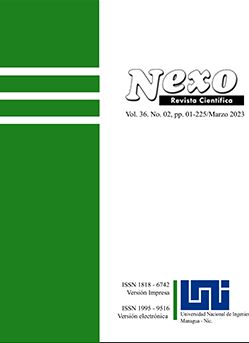Financial, socioeconomic and environmental ex-ante evaluation of a 300 kw gasifier that generates electricity using agricultural waste in León, Nicaragua
DOI:
https://doi.org/10.5377/nexo.v36i02.15992Keywords:
integral evaluation, financial, economic, social profitability, environmental impact, gasification, electric energyAbstract
In this article, a model project of a 300 KW gasifier that uses agricultural residues to generate electricity in the department of León, Nicaragua, was integral evaluated. An integral evaluation model was used to assess the project, which included a financial evaluation indicating profitability through the net present value and the internal rate of return; the economic evaluation through the net economic present value and the economic internal rate resulted in the same profitable. Also, the socioeconomic benefits of the project and the environmental impacts in the form of greenhouse gas emissions were evaluated. Therefore, it is determined that for the assumptions considered in this study, the electricity generation activity using agricultural waste gasification is Integrally profitable.
Downloads
2573
Downloads
Published
How to Cite
Issue
Section
License
Copyright (c) 2023 Universidad Nacional de Ingeniería

This work is licensed under a Creative Commons Attribution 4.0 International License.
The authors who publish in Nexo Scientific Journal agree to the following terms:
- Authors retain the copyright and grant the journal the right of the first publication under the license Creative Commons Attribution License, which allows others to share the work with a recognition of the authorship of the work and the initial publication in Nexo Scientific Journal.
- Authors may separately establish additional agreements for the non-exclusive distribution of the version of the work published in the journal (for example, in an institutional repository or a book), with the recognition of the initial publication in Nexo Scientific Journal.
- Authors are allowed and encouraged to disseminate their works electronically (for example, in institutional repositories or in their own website) before and during the submission process, as it can lead to productive exchanges, as well as earlier and greater citation of published works.










